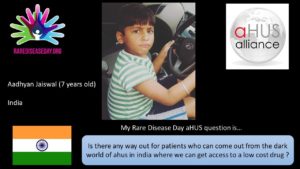A question which featured a number of times in the Rare Disease Day video was about access to complement inhibitors for everyone with aHUS who needs them.
This is a big issue with many aspects. Among those questions was one by Aadhryan from India was one who asked specifically :
“ Is there any way out for patients who can come out from the dark world of aHUS in India where we can get access to a low cost drug?

The alliance has featured several news items about aHUS in India and the issues faced there in getting a treatment for aHUS
The story about Annanya which featured in an article last year ( read here) illustrates the grave problems patients face.
An alliance associate from aHUS India also spoke at the UN about accessing drugs for rare diseases in countries like India – South Africa faces similar issues.
There are hurdles to overcome even if research has found found a clinically effective treatment which there is for aHUS even if it is not a cure.
Firstly the manufacturers of the treatment must want to sell their products in the country.
For Indian aHUS patients so far no Pharma has sought to market a complement inhibitor in India; albeit that a couple of small sales of eculizumab have happened under very strict importing controls.
Pharma are reluctant to sell their drugs in India because the patents that covers the drug might be abused by companies in that country which make unregulated copies of the drugs.
So access to eculizumab falls at the first hurdle in India.
But what if the hurdle could be over come.
Successful access to treatment also needs a leading clinician in the country to recommend it. India has many eminent clinicians who would support access to eculizumab, one in particular, who is prominent at aHUS conference around the world, is Prof. Avrind Bagga.
Prof Bagga has extensive experience of treating Indian aHUS patients in New Dehli , particularly those with Anti Factor H antibody mediated aHUS. His registry of known aHUS patients has grown to over 500 patients. There could be between 2500 and 7000 aHUS patients in India (Using the prevalence estimates from the answer to Alaina’s question about how many aHUS patients there are ) .
Prof Bagga is holding a Consensus Meeting* about treating aHUS in India at the end of this month , 31 March in New Delhi. He is bringing together dozens of Indian clinicians from around India with an interest in aHUS to develop treatment guidelines for aHUS in India.
Pharma will no doubt be observing this development and hopefully may be considering ways and means to make something available with a price offering that in itself is not a barrier. We will see.
As those in the rest of the world know, having a effective drug treatment available and clinicians willing to use it is not the end of the matter.
There are more hurdles to overcome and the treatment needs to :
- be seen as a priority among the multitude of other competing health treatments
- pass an evaluation by Health Policy organisations for clinical and cost effectiveness
- become part of the heath policy of the country
- be funded from private or public sources to pay the health care provider
- be actually used in accordance with the policy in a sustainable way.
Most countries also have patient advocacy groups to participate and support the treatment as it overcomes such hurdles.
To do that more patients and their families need to become involved in public patient engagement, because, no one else knows more about what it means to live with aHUS.
Aadhyan has made his statement in support of having a treatment for all by appearing in the video.
He was joined in the video by others who asked similar questions including :
- Lou-Anne of Lille, France
- Mariek from Poland
- Merche of the Hospital de l’infant, Spain
- Duke from Spring Creek Nevada, USA
Is this the beginning of an international movement, Aadhyan ?
*Consensus Meeting on Diagnosis & Management of HUS in India
31 March – 1 April 2017
Dr. Ramalingaswami Board Room, AIIMS, New Delhi
| 31 March | ||
| 9.00 am | Welcome & Introduction | |
| 9.30 – 10.30 am | Plenary I: Key questions | Coordinators: all groups |
| 10.30 – 12.30 pm | Breakout sessions I | All groups |
| 12.30 – 1.30 pm | Lunch | |
| 1.30 – 2.00 pm | aHUS Alliance | Kamal Shah |
| 2.30 – 4.00 pm | Plenary II: Consensus, unresolved areas | Coordinators: all groups |
| 4.00 – 4.30 | Tea | |
| 4.30 – 6.00 pm | Breakout sessions II | All groups |
| 6.00 – 7.00 pm | Discussion | |
| 7.00 pm | Dinner | |
| 1 April | ||
| 8.00 – 10.00 am | Plenary III: Final presentations | Coordinators: all groups |
| 10.00 – 10.30 am | Comments |
| Group | Topic | Coordinators |
| Group 1 | Investigations for evaluating TMA; role of kidney biopsy; genetics | Ranjeet Theragaonkar, Kirti Sudha Mishra |
| Group 2 | Shigatoxin and infection associated HUS | Anil Vasudevan, Jyoti Sharma |
| Group 3 | Atypical HUS: evaluation & management | Aditi Sinha, SK Patnaik |
| Group 4 | Complement blockade | Pankaj Hari, Sidharth Sethi |

